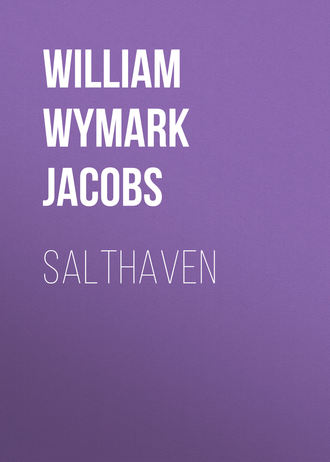 полная версия
полная версияSalthaven

W. W. Jacobs
Salthaven
CHAPTER I
MR. JOHN VYNER, ship-owner, pushed his chair back from his writing-table and gazed with kindly condescension at the chief clerk as he stood before it with a handful of papers.
"We shall be able to relieve you of some of your work soon, Hartley," he said, slowly. "Mr. Robert will come into the firm next week." The chief clerk bowed.
"Three years at Cambridge," resumed Mr. Vyner, meditatively, "and two years spent up and down the world studying the business methods of other nations ought to render him invaluable to us."
"No doubt, sir," said Hartley. "It is an excellent training."
"For a time," said the ship-owner, leaning back and placing the tips of his fingers together, "for a time I am afraid that he will have to have your room. Later on—ha—if a room should—ha—fall vacant in the building, we might consider taking it."
"Yes, sir," said the other.
"And, of course," resumed Mr. Vyner, "there is one great advantage in your being in the general office which must not be overlooked; you can keep an eye on the juniors better."
"It is cheerful, too, sir," suggested the chief clerk; "the only thing—"
"Yes?" said Mr. Vyner, somewhat loudly.
Mr. Hartley shrank a little. "I was going to say that it is rather a small room for Mr. Robert," he said, quickly.
"It will do for a time," said the other.
"And—and I think I told you, sir, that there is an unpleasant sm—odour."
Mr. Vyner knitted his brows. "I offered to have that seen to, but you said that you didn't mind it," he remarked.
"Just so, sir," said Hartley; "but I was thinking of Mr. Robert. He might not like it; it's very strong at times—very strong indeed."
"You ought to have had it attended to before," said Mr. Vyner, with some severity. "You had better call at Gillows' on your way home and ask them to send a man up first thing to-morrow morning."
He drew his chair to the table again, and Hartley, after lingering a moment, withdrew to his own room.
Ten out of his thirty-five years of service had been passed there, and he stifled a sigh as he looked at the neat array of drawers and pigeon-holes, the window overlooking the bridge and harbour, and the stationer's almanac which hung over the fireplace. The japanned letter-rack and the gum-bottle on the small mantelpiece were old friends.
The day's work completed, he walked home in sober thought. It was a pleasant afternoon in May, but he was too preoccupied to pay any heed to the weather, and, after informing a man who stopped him to tell him that he had lost a wife, six children, and a right leg, that it was just five minutes past six, resumed his way with a hazy idea of having been useful to a fellow-creature.
He brightened a little as he left the bustle of the town behind, and from sheer force of habit glanced at the trim front-gardens as he passed. The cloud lifted still more as he reached his own garden and mentally compared his flowers with those he had just passed.
His daughter was out, and tea for one was laid in the front room. He drew his chair to the table, and taking up the tea-pot, which the maid had just brought in, poured himself out a cup of tea.
He looked round the comfortable room with pleasure. After all, nobody could take that from him. He stirred his tea and had just raised the cup to his lips when he set it down untasted and sat staring blankly before him. A low rumble of voices from the kitchen fell unpleasantly on his ear; and his daughter Joan had left instructions too specific to be misunderstood as to his behaviour in the event of Rosa entertaining male company during her absence. He coughed twice, loudly, and was glad to note the disappearance of the rumble. Pleased with his success he coughed a third time, a sonorous cough charged with importance. A whispered rumble, possibly a suggestion of withdrawal, came from the kitchen.
"Only his tea gone the wrong way," he heard, reassuringly, from Rosa.
The rumble, thus encouraged, deepened again. It became confident and was heard to laugh. Mr. Hartley rose and, standing on the hearthrug with legs apart, resolved to play the man. He leaned over and rang the bell. The voices stopped. Then he heard Rosa say, "Not him! you stay where you are."
She came slowly in response to the bell, and thrusting a yellow head in at the door gazed at him inquiringly.
"I—I want a little more hot water," said her master, mildly.
"More?" repeated Rosa. "Why, I brought you over a pint."
"I want some more," said Mr. Hartley. Then a bright thought struck him. "I am expecting Miss Joan home every minute," he added, significantly.
Rosa tossed her head. "She ain't coming home till nine," she remarked, "so if it's only for her you want the hot water, you won't want it."
"I—I thought I heard a man's voice," he said at last.
"Very good," said her master, with an attempt at dignity; "you can go."
Rosa went, whistling. Mr. Hartley, feeling that he had done all that could be expected of a man, sat down and resumed his tea. The rumbling from the kitchen, as though in an endeavour to make up for lost time, became continuous. It also became louder and more hilarious. Pale and determined Mr. Hartley rose a second time and, seizing the bell-pull, rang violently.
"Does anybody want to see me?" he inquired, as Rosa's head appeared.
"You? No," was the reply.
"I thought," said her master, gazing steadily at the window, "I thought somebody was inquiring for me."
"Well, there hasn't been," said Rosa.
Mr. Hartley, with a magisterial knitting of the brows, which had occasionally been found effective with junior clerks, affected to ponder.
"I—I thought I heard a man's voice," he said at last.
"Nobody's been inquiring for you," said Rosa calmly. "If they did I should come in and let you know. Nobody's been for you that I've heard of, and I don't see how they could come without me knowing it."
"Just so," said Mr. Hartley. "Just so."
He turned to the mantelpiece for his tobacco-jar, and Rosa, after standing for some time at the "ready" with a hostile stare, cleared her throat noisily and withdrew. The voices in the kitchen broke out with renewed vehemence; Mr. Hartley coughed again—a cough lacking in spirit—and, going out at the front door, passed through the side-entrance to the garden and tended his plants with his back to the kitchen window.
Hard at work at the healthful pastime of weeding, his troubles slipped from him. The path became littered with little tufts of grass, and he was just considering the possibility of outflanking the birch-broom, which had taken up an advantageous position by the kitchen window, when a young man came down the side-entrance and greeted him with respectful enthusiasm.
"I brought you these," he said, opening a brown leather bag and extracting a few dried roots. "I saw an advertisement. I forget the name of them, but they have beautiful trumpet-shaped flowers. They are free growers, and grow yards and yards the first year."
"And miles and miles the second," said Mr. Hartley, regarding them with extraordinary ferocity. "Bindweed is the name, and once get it in your garden and you'll never get rid of it."
"That wasn't the name in the advertisement," said the other, dubiously.
"I don't suppose it was," said Hartley. "You've got a lot to learn in gardening yet, Saunders."
"Yes, sir," said the other; "I've got a good teacher, though."
Mr. Hartley almost blushed. "And how is your garden getting on?" he inquired.
"It's—it's getting on," said Mr. Saunders, vaguely.
"I must come and have a look at it," said Hartley.
"Not yet," said the young man, hastily. "Not yet. I shouldn't like you to see it just yet. Is Miss Hartley well?"
Mr. Hartley said she was, and, in an abstracted fashion, led the way down the garden to where an enormous patch of land—or so it seemed to Mr. Saunders—awaited digging. The latter removed his coat and, hanging it with great care on an apple tree, turned back his cuffs and seized the fork.
"It's grand exercise," said Mr. Hartley, after watching him for some time.
"Grand," said Mr. Saunders, briefly.
"As a young man I couldn't dig enough," continued the other, "but nowadays it gives me a crick in the back."
"Always?" inquired Mr. Saunders, with a slight huskiness.
"Always," said Mr. Hartley. "But I never do it now; Joan won't let me."
Mr. Saunders sighed at the name and resumed his digging. "Miss Hartley out?" he asked presently, in a casual voice.
"Yes; she won't be home till late," said the other. "We can have a fine evening's work free of interruptions. I'll go and get on with my weeding."
He moved off and resumed his task; Mr. Saunders, with a suppressed groan, went on with his digging. The ground got harder and harder and his back seemed almost at breaking-point. At intervals he had what gardeners term a "straight-up," and with his face turned toward the house listened intently for any sounds that might indicate the return of its mistress.
"Half-past eight," said Hartley at last; "time to knock off. I've put a few small plants in your bag for you; better put them in in the morning before you start off."
Mr. Saunders thanked him, and reaching down his coat put it on and followed Mr. Hartley to the house. The latter, steering him round by the side-entrance, accompanied him to the front gate.
"If you would like to borrow my roller or lawn-mower at any time," he said, cordially, "I should be very pleased to lend them to you. It isn't very far."
Mr. Saunders, who would sooner have died than have been seen dragging a roller through the streets, thanked him warmly. With an idea of prolonging his stay, he suggested looking at them.
"They're locked up now," said Mr. Hartley. "See them another time. Good-night."
"Good-night," said Mr. Saunders. "I'll look in to-morrow evening, if I may."
"No use to-morrow," Mr. Hartley called after him; "there will be nobody at home but Joan."
CHAPTER II
MR. ROBERT VYNER entered upon his new duties with enthusiasm. The second day he was at the office half an hour before anybody else; on the third day the staff competed among themselves for the honour of arriving first, and greeted him as respectfully as their feelings would permit when he strolled in at a quarter to eleven. The arrival of the senior partner on the day following at a phenomenally early hour, for the sake of setting an example to the junior, filled them with despair. Their spirits did not revive until Mr. John had given up the task as inconvenient and useless.
A slight fillip was given to Robert's waning enthusiasm by the arrival of new furniture for his room. A large mahogany writing-table, full of drawers and pigeon-holes, gave him a pleasant sense of importance, and the revolving chair which went with it afforded a welcome relief to a young and ardent nature. Twice the office-boy had caught the junior partner, with his legs tucked up to avoid collisions, whirling wildly around, and had waited respectfully at the door for the conclusion of the performance.
"It goes a bit stiff, Bassett," said the junior partner.
"Yessir," said Bassett.
"I'm trying to ease it a bit," explained Mr. Robert.
"Yessir," said Bassett again.
Mr. Robert regarded him closely. An undersized boy in spectacles, with a large head and an air of gravity and old age on his young features, which the junior thought somewhat ill-placed for such an occasion.
"I suppose you never twizzle round on your chair, Bassett?" he said, slowly.
Bassett shivered at the idea. "No, sir," he said, solemnly; "I've got my work to do."
Mr. Robert sought for other explanations. "And, of course, you have a stool," he remarked; "you couldn't swing round on that."
"Not even if I wanted to, sir," said the unbending Bassett.
Mr. Robert nodded, and taking some papers from his table held them before his face and surveyed the youth over the top. Bassett stood patiently to attention.
"That's all right," said the other; "thank you."
"Thank you, sir," said Bassett, turning to the door.
"By the way," said Mr. Robert, eying him curiously as he turned the handle, "what exercise do you take?"
"Exercise, sir?" said Bassett.
Mr. Robert nodded. "What do you do of an evening for amusement after the arduous toils of the day are past? Marbles?"
"No, sir," said the outraged one. "If I have any time to spare I amuse myself with a little shorthand."
"Amuse!" exclaimed the other. He threw himself back in his chair and, sternly checking its inclination to twirl again, sought for a flaw in the armour of this paragon. "And what else do you do in the way of recreation?"
"I've got a vivarium, sir."
Mr. Robert hesitated, but curiosity got the better of his dignity. "What's that?" he inquired.
"A thing I keep frogs and toads in, sir," was the reply.
Mr. Robert, staring hard at him, did his honest best to check the next question, but it came despite himself. "Are you—are you married, Bassett?" he inquired.
Bassett regarded him calmly. "No, sir," he said, with perfect gravity. "I live at home with my mother."
The junior partner gave him a nod of dismissal, and for some time sat gazing round the somewhat severely furnished office, wondering with some uneasiness what effect such surroundings might have on a noble but impressionable temperament. He brought round a few sketches the next day to brighten the walls, and replaced the gum-bottle and other useful ornaments by some German beer-mugs.
Even with these aids to industry he found the confinement of office somewhat irksome, and, taking a broad view of his duties, gradually relieved Bassett of his errands to the docks. It was necessary, he told himself, to get a thorough grasp of the whole business of ship-owning. In the stokeholds of Vyner and Son's' steamships he talked learnedly on coal with the firemen, and, quite unaided, hit on several schemes for the saving of coal—all admirable except for the fact: that several knots per hour would be lost.
"The thing is to take an all-round view," he said to Captain Trimblett, of the SS. Indian Chief, as he strolled back with that elderly mariner from the ship to the office one day.
"That's it, sir," said the captain.
"Don't waste, and, at the same time, don't pinch," continued Mr. Robert, oracularly.
"That's business in a nutshell," commented the captain. "Don't spoil the ship for a ha'porth of tar, and, on the other hand, don't get leaving the tar about for other people to sit on."
"But you got it off," said Robert, flushing. "You told me you had."
"As far as tar ever can be got off," asserted the captain, gloomily. "Yes. Why I put my best trousers on this morning," he continued, in a tone of vague wonder, "I'm sure I don't know. It was meant to be, I suppose; it's all for some wise purpose: that we don't know of."
"Wise fiddlesticks!" exclaimed Robert, shortly—"Your particular brand of fatalism is the most extraordinary nonsense I ever heard of. What it means: is that thousands of years ago, or millions, perhaps, was decided that I should be born on purpose to tar your blessed trousers."
"That and other things," said the immovable captain. "It's all laid down for us, everything we do, and we can't help doing it. When I put on those trousers this morning—"
"Oh, hang your trousers," said Robert. "You said it didn't matter, and you've been talking about nothing else ever since."
"I won't say another word about it," said the captain. "I remember the last pair I had done; a pair o' white ducks. My steward it was; one o' those silly, fat-headed, staring-eyed, garping—"
"Go on," said the other, grimly.
"Nice, bright young fellows," concluded the captain, hastily; "he got on very well, I believe."
"After he left you, I suppose?" said Mr. Vyner, smoothly.
"Yes," said the innocent captain. He caught a glance of the other's face and ruminated. "After I had broken him of his silly habits," he added.
He walked along smiling, and, raising his cap with a flourish, beamed in a fatherly manner on a girl who was just passing. Robert replaced his hat and glanced over his left shoulder.
"Who is that?" he inquired. "I saw her the other day; her face seems familiar to me."
"Joan Hartley," replied the captain. "Nathaniel Hartley's daughter. To my mind, the best and prettiest girl in Salthaven."
"Eh?" said the other, staring. "Hartley's daughter? Why, I should have thought—"
The best and prettiest girl in Salthaven
"Yes, sir?" said Captain Trimblett, after a pause.
"Nothing," concluded Robert, lamely. "She doesn't look like it; that's all."
"She's got his nose," maintained the captain, with the obstinate air of a man prepared to go to the stake for his opinions. "Like as two peas their noses are; you'd know them for father and daughter anywhere by that alone."
Mr. Vyner assented absently. He was wondering where the daughter of the chief clerk got her high looks from.
"Very clever girl," continued the captain. "She got a scholarship and went to college, and then, when her poor mother died, Hartley was so lonely that she gave it all up and came home to keep house for him."
"Quite a blue-stocking," suggested Robert.
"There's nothing of the blue-stocking about her," said the captain, warmly. "In fact, I shouldn't be surprised if she became engaged soon."
Mr. Vyner became interested. "Oh!" he said, with an instinctive glance over his left shoulder.
Captain Trimblett nodded sagely. "Young fellow of the name of Saunders," he said slowly.
"Oh!" said the other again.
"You might have seen him at Wilson's, the ship-broker's," pursued the captain. "Bert Saunders his name is. Rather a dressy youngster, perhaps. Generally wears a pink shirt and a very high stand-up collar—one o' those collars that you have to get used to."
Mr. Vyner nodded.
"He's not good enough for her," said the captain, shaking his head. "But then, nobody is. Looked at that way it's all right."
"You seem to take a great interest in it," said Robert.
"He came to me with his troubles," said Captain Trimblett, bunching up his gray beard in his hand reflectively. "Leastways, he made a remark or two which I took up. Acting under my advice he is taking up gardening."
Mr. Vyner glanced at him in mystification.
"Hartley is a great gardener," explained the other with a satisfied smile. "What is the result? He can go there when he likes, so to speak. No awkwardness or anything of that sort. He can turn up there bold as brass to borrow a trowel, and take three or four hours doing it."
"You're a danger to society," said Robert, shaking his head.
"People ought to marry while they're young," said the captain. "If they don't, like as not they're crazy to marry in their old age. There's my landlord here at Tranquil Vale, fifty-two next birthday, and over his ears in love. He has got it about as bad as a man can have it."
"And the lady?" inquired Robert.
"She's all right," said the captain. He lowered his voice confidentially. "It's Peter's sister, that's the trouble. He's afraid to let her know. All we can do is to drop a little hint here and a little hint there, so as to prepare her for the news when it's broken to her."
"Is she married?" inquired Robert, pausing as they reached the office.
"No," said Captain Trimblett; "widow."
Mr. Vyner gave a low whistle. "When do you sail, cap'n?" he inquired, in a voice oily with solicitude.
"Soon as my engine-room repairs are finished, I suppose," said the other, staring.
"And you—you are giving her hints about courtship and marriage?" inquired Mr. Vyner, in tones of carefully-modulated surprise.
"She's a sensible woman," said the captain, reddening, "and she's no more likely to marry again than I am."
"Just what I was thinking," said Mr. Vyner.
He shook his head, and, apparently deep in thought, turned and walked slowly up the stairs. He was pleased to notice as he reached the first landing that the captain was still standing where he had left him, staring up the stairs.
CHAPTER III
IN a somewhat ruffled state of mind Captain Trimblett pursued his way toward Tranquil Vale, a row of neat cottages situated about a mile and a half from the town, and inhabited principally by retired mariners. The gardens, which ran down to the river, boasted a particularly fine strain of flag-staffs; battered figure-heads in swan-like attitudes lent a pleasing touch of colour, and old boats sawn in halves made convenient arbours in which to sit and watch the passing pageant of the sea.
At No. 5 the captain paused to pass a perfectly dry boot over a scraper of huge dimensions which guarded the entrance, and, opening the door, finished off on the mat. Mrs. Susanna Chinnery, who was setting tea, looked up at his entrance, and then looked at the clock.
"Kettle's just on the boil," she remarked.
"Your kettle always is," said the captain, taking a chair—"when it's time for it to be, I mean," he added, hastily, as Mrs. Chinnery showed signs of correcting him.
"It's as easy to be punctual as otherwise," said Mrs. Chinnery; "easier, if people did but know it."
"So it is," murmured the captain, and sat gazing, with a sudden wooden expression, at a picture opposite of the eruption of Vesuvius.
"Peter's late again," said Mrs. Chinnery, in tones of hopeless resignation.
"Business, perhaps," suggested Captain Trimblett, still intent on Vesuvius.
"For years and years you could have set the clock by him," continued Mrs. Chinnery, bustling out to the kitchen and bustling back again with the kettle; "now I never know when to expect him. He was late yesterday."
Captain Trimblett cleared his throat. "He saw a man nearly run over," he reminded her.
"Yes; but how long would that take him?" retorted Mrs. Chinnery. "If the man had been run over I could have understood it."
The captain murmured something about shock.
"On Friday he was thirty-three minutes late," continued the other.
"Friday," said the faithful captain. "Friday he stopped to listen to a man playing the bagpipes—a Scotchman."
"That was Thursday," said Mrs. Chinnery.
The captain affected to ponder. "So it was," he said, heartily. "What a memory you have got! Of course, Friday he walked back to the office for his pipe."
"Well, we won't wait for him," said Mrs. Chinnery, taking the head of the table and making the tea. "If he can't come in to time he must put up with his tea being cold. That's the way we were brought up."
"A very good way, too," said the captain. He put a radish into his mouth and, munching slowly, fell to gazing at Vesuvius again. It was not until he had passed his cup up for the second time that a short, red-faced man came quickly into the room and, taking a chair from its place against the wall, brought it to the table and took a seat opposite the captain.
"Late again, Peter," said his sister.
"Been listening to a man playing the cornet," said Mr. Truefitt, briefly.
Captain Trimblett, taking the largest radish he could find, pushed it into his mouth and sat gazing at him in consternation. He had used up two musical instruments in less than a week.
"You're getting fond of music in your old age," said Mrs. Chinnery, tartly. "But you always are late nowadays. When it isn't music it's something else. What's come over you lately I can't think."
Mr. Truefitt cleared his throat for speech, and then, thinking better of it, helped himself to some bread and butter and went on with his meal. His eyes met those of Captain Trimblett and then wandered away to the window. The captain sprang into the breach.
"He wants a wife to keep him in order," he said, with a boldness that took Mr. Truefitt's breath away.
"Wife!" exclaimed Mrs. Chinnery. "Peter!"
She put down her cup and laughed—a laugh so free from disquietude that Mr. Truefitt groaned in spirit.
"He'll go off one of these days." said the captain with affected joviality. "You see if he don't."
Mrs. Chinnery laughed again. "He's a born bachelor," she declared. "Why, he'd sooner walk a mile out of his way any day than meet a woman. He's been like it ever since he was a boy. When I was a girl and brought friends of mine home to tea, Peter would sit like a stuffed dummy and never say a word."









